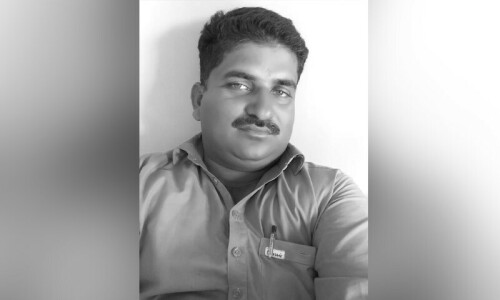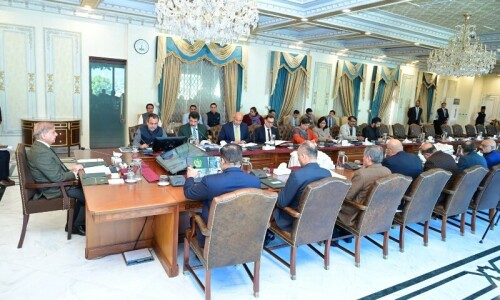ISLAMABAD: After failed negotiations with the federal government, during which they stayed in the Ministry of National Health Services (NHS) for six hours and allegedly even faced abusive language, protesting lady health workers (LHW) announced on Saturday that they will enter Parliament House during the parliamentary session tomorrow (Monday).
Meanwhile, the NHS ministry has argued that the federal government has nothing to do with LHWs because, following the 18th Amendment, they are now dealt with by provincial governments.
The women have continued to face difficulties as their protest continued for a fourth day, as they have not been provided sanitation, water or food facilities.
On Saturday morning, the workers were invited to the Ministry of NHS at 12:30pm for negotiations with Punjab Health Secretary Ajmal Bhatti.
While the media was given the impression that negotiations continued for six hours, LHW President Ruksana Anwar told the press later that not only did the negotiations fail, but the women were also harassed and threatened by ministry officers.
After six hours at the NHS ministry, talks with govt make no headway
She said it seemed as if officers who habitually misbehave with women were sent for the dialogue with them.
“Moreover, every night, some men are sent to the location of the sit-in and harass the women. Now we have been left with no choice but to go to parliament, so we have decided to enter parliament in Monday as a session is going to be held,” she said.
During the negotiations, Ms Anwar said, ministry officers told the LHWs that they had no proof that they were LHWs.
“However, we told them that we have show-cause notices which should be considered as proof that we are LHWs. Then we were told that the Punjab health secretary did not have a mandate to make any promises. We had a 10 point agenda but they said that they cannot guarantee even a single point in writing,” she said.
She appealed to the chief justice and chief of army staff to take notice, as sanitation, water and even food has been prohibited for sit-in participants.
The protesters were initially using the toilets at a fuel station and a metro bus station near the sit-in, but the staff at both were later told not to let them use these facilities.
Restaurants have also been told not to sell food to them, due to which on Friday, PPP leader Shazia Marri provided food and water to the protesters.
On Saturday, some police officials provided water to the sit-in participants.
An NHS ministry official who asked not to be named said the federal government had nothing to do with LHWs.
“After the 18th Amendment, the LHW programme was devolved to the provinces and now provinces can give assurances regarding salary structure or wages. However, the LHWs believe that a number of times they came to Islamabad and were given verbal assurances every time but in the end no one implemented them,” he said.
The LHW Programme for family planning and primary healthcare was launched in 1993-4.
At the time, 110,000 women were recruited and deployed across the country to provide promotive, preventive, curative and rehabilitative services to their target population.
They also help cultivate community participation through enhanced awareness, attitude change and mobilisation, and are responsible for increased immunisation coverage in children aged between 12 and 23 months.
LHWs are responsible for focusing on maternal and child health by contributing towards the reduction in the infant mortality rate from 85 to 55 per 1,000 live births and the decline in the maternal mortality rate from 400 to 180 in 100,000 live births.
Their other responsibilities include the expansion of family planning services in urban slums and rural areas, and increase in the contraceptive prevalence rate from 22pc to 42pc in rural areas and 40pc to 58pc in urban areas, and the improvement in the nutritional status of mothers and children.
Published in Dawn, October 18th, 2020














































